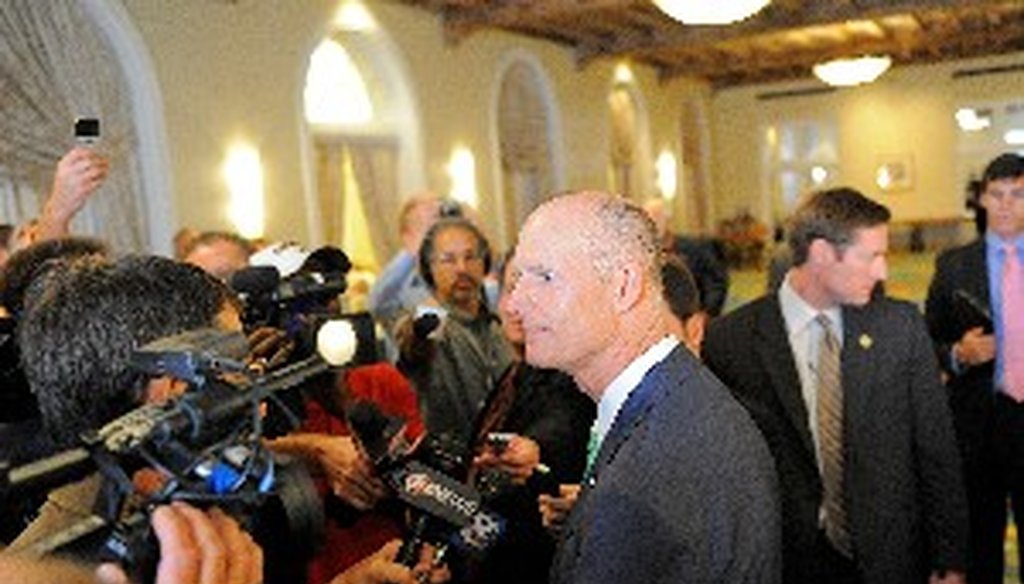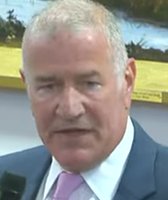Stand up for the facts!
Our only agenda is to publish the truth so you can be an informed participant in democracy.
We need your help.
I would like to contribute

Florida Gov. Rick Scott pledged to create 700,000 jobs.
Is Florida under Gov. Rick Scott adding jobs, or actively destroying them?
We forgive you if you’re not sure — listen to Republicans or Democrats lately, and you might think either:
• Things are pretty rosy: We’ve recently had the best month for job creation in the country, adding 76,800 jobs since January.
• Things are bleak and getting bleaker: We’ve destroyed 100,000 jobs under our new governor.
The first picture comes from the governor himself, who relies on statistics from state and federal agencies. The second comes from Florida Democrats, who keep an informal tally they delight in sharing in news releases, letters to supporters and on Twitter.
Sign up for PolitiFact texts
And both pictures have problems.
PolitiFact Florida took a deeper look, and we can tell you the jobs picture is neither so rosy nor so bleak. It’s also not entirely clear. And no matter what’s happening, it won’t all be to Scott’s credit — or blame.
In fact, let’s start there.
"Business cycles are bigger than politics," said Sean Snaith, an economist at the University of Central Florida who issues regular economic forecasts.
In case you hadn’t noticed, Florida’s unemployment rate is among the highest in the country. So it was nearly guaranteed that whoever took office in January would enjoy a nice upswing in jobs over four years. In November, state economists projected the state would add nearly 500,000 jobs by fiscal year 2013-14.
That’s with or without Scott.
"There’s one thing you can’t criticize about Gov. Scott, and that’s his sense of timing," Snaith said. "He’s coming into office at the perfect time on a platform of job creation."
But Scott is banking on more than just timing. He’s promising to make structural changes that he says will create 700,000 jobs in the state over seven years.
"With structural reforms, the promise is of more jobs in the intermediate or long run, perhaps even at the cost of a dip in the short run — fewer government jobs, for example," said David Denslow, a research economist at the University of Florida.
Sound familiar? The new state budget chops 4,500 government positions, but Scott says he believes cutting state spending will lessen the burden on businesses, leading to more private-sector jobs later. He also said he would invest in economic development, cut regulation and reduce taxes — all in the name of aiding private employers.
The question is whether it will work — and how we’ll be able to tell.
Which brings us back to our two portraits. Scott boasts that his tenure has boosted job creation already.
"Our efforts to make Florida the most business-friendly state are clearly paying off," he said as he announced the state had led the nation in job creation in May.
Folks who crunch the numbers for a living would beg to differ.
"It is far too early to tell whether Gov. Scott’s policies are having any effect on jobs in Florida," said UF’s Denslow.
He pointed out that recent history shows huge swoops in job creation — way, way up since 1990, with some leveling off in the early 2000s, then another climb, then the familiar sickening dive marking the Great Recession. The few jobs added since January 2011 barely register as a change on that roller coaster ride. So it’s impossible to see yet whether there’s a positive trend, he said.
Snaith at UCF agreed.
"I think we’re not really through the semester: We can’t give a final grade here. It’s an incomplete," he said.
• • •
Scott told a group gathered for a bill-signing in late June that Florida had added 28,000 jobs from April to May, while the entire nation had only added 54,000. He has repeated the claim since, as recently as Friday.
According to a standard estimate of employment in April and May, he’s right — Florida led the nation by creating 28,000 jobs (Ohio was second, adding 12,000 jobs).
But by another reasonable measure, Scott was wildly wrong. According to that second measure, Florida lost 3,000 jobs.
The difference is how you interpret data collected by the federal Bureau of Labor Statistics.
It’s typically helpful to look at job estimates that have been seasonally adjusted, because formulas make up for differences between months such as the number of weeks, holidays and seasonal employment patterns.
That’s what Scott did to arrive at his job figure.
But Denslow pointed out that seasonal adjustment formulas are based on recent years to take into account "normal" over-the-month change. When you have enormous changes, as with the recent housing boom and bust and the Deepwater Horizon oil spill, seasonal adjustment "becomes extraordinarily difficult," he said.
The difference in interpreting the numbers in Florida’s case is significant — from up 28,000 jobs through one analysis, to down 3,000 jobs through the other.
That raises some real questions.
Gary Burtless, an economist with the centrist-to-liberal Brookings Institution, explained that with seasonal adjustment being the difference between job gains and losses, even a small error in the Bureau of Labor Statistics formula could make the governor’s claim "wildly off base."
"It may be true, and perhaps revisions in the raw data or the seasonal adjustment factor may someday increase the probability that it is true," he said. "But based on the evidence at hand, I would say the governor has made a very silly claim."
So much for a stellar May. Instead it’s a might-have-been-stellar May.
As such, we rate the governor’s claim Half True.
• • •
The picture’s more promising when you check out all of 2011. The number of jobs added in Florida since January — 76,800, according to the seasonally adjusted estimate — only improves according to unadjusted numbers. While overlooking seasonal adjustment introduces its own problems, those numbers also support the idea of job growth, with a gain of 119,700 jobs.
Scott has repeated the 76,800 jobs claim several times, and he’s right. But economists warn of giving Scott — or any one person — too much credit for creating jobs, or too much blame for jobs lost.
With that caveat, we rate the claim Mostly True.
• • •
Then there’s the argument from Democrats, who claim that Scott "has destroyed over 100,000 jobs," as Democratic Party chairman Rod Smith put it in an e-mail to supporters last week.
If you’ve read this far, you know you have good reason to be skeptical of this claim — job creation is up in the state since Scott took office. So what did Democrats mean?
We asked Eric Jotkoff, spokesman for the state party.
He explained it was a "pretty conservative estimate" based on — ready — expected teacher layoffs, cuts to local police, firefighters and other public employees, cuts to Medicaid reimbursement rates, cuts to university spending, the planned privatization of South Florida prisons, the rejection of federal funding for high-speed rail, the shift of funding from a transportation trust fund expected to affect construction projects, a change in the way water districts are funded, and Scott’s refusal to meet with a biotech company (Jackson Labs) that ultimately didn’t locate a new project in the state. Jotkoff also left the door open for other job-killers he wasn’t thinking of just then.
To recap: budget cuts, prison privatization, high-speed rail, Jackson Labs.
No matter what those estimates add up to, the Democrats’ claim has several problems:
• "Has destroyed" makes it sound like jobs are already gone — but the analysis is almost entirely based on jobs that are expected to be lost.
• "Has destroyed" also makes it sound like Scott’s policies have eliminated 100,000 jobs that already existed. But that’s only the case for some of the jobs included in Jotkoff’s tally, such as cuts leading to layoffs of state and local employees. Others, from high-speed rail to highway construction to biotech jobs, didn’t yet exist — and may never have materialized.
• Lastly, in the same way it’s troublesome for Scott to take credit for job creation, it’s also problematic for Democrats to singularly blame Scott for job losses. The Legislature debated and passed the budgets that reduce funding for local districts, and signed off on a reduction to the state workforce.
We rate the Democrats’ claim False.
Let a few years pass, and we’ll have a clearer picture of Scott’s true impact on jobs in the state — one that will still be open to interpretation. So pass the rose-colored glasses. Or mirrored shades.
Our Sources
See individual items.


















































